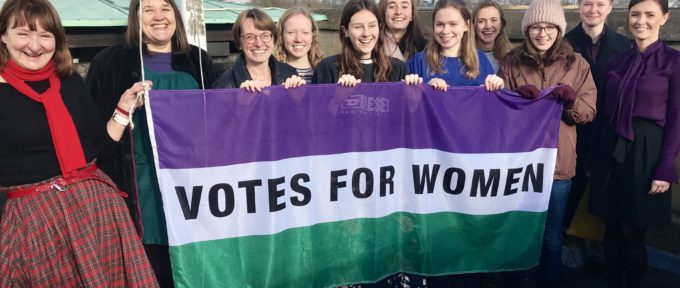

On February 6th the anniversary of the People’s Representation act of 1918 was remembered. This was the first time any women could vote in this country. The franchise was extended to property owning women over 30 and to all men over 21. The Guardian(6/2/18) published photographs of 50 individuals influential in getting women the vote. I was pleased to see amongst these the founder and first chair of the Church League for Women’s Suffrage. This Church of England organisation sought to educate people within the church on the reasons why women should be given a vote and to pray for a changed attitude to the rights of women. The two photos were of Claude Hinscliffe and Maude Royden. Claude, a curate in London, founded the league in 1909 to ‘band together, on a non-party basis, Suffragists of every shade of opinion who are Church people in order to secure for women the vote in Church and State, as it is or may be granted to men.’ He took the position of secretary and the preacher and campaigner, Maude Royden, became the first chair.
By 1913 it had 103 branches and over 5,000 members across the country. Members were encouraged to make the communion service on the first Sunday of the month a time of prayer for the cause. The CLWS held divided views on the militancy of the suffragettes and a refusal to condemn such behaviour led to a fall in numbers. After the 1918 vote it changed its name to The Church League for the Church Militant to campaign for women’s ordination; a forerunner of MOW and WATCH.
Yet, as we mark the anniversary of women’s suffrage we need to be realistic about how strongly it was opposed. The militancy of the suffragettes would not have been necessary if reasoned arguments had carried the day. Whilst the church had people like Claude and Maude to champion the cause there were also plenty of church members who actively campaigned against the vote as well as a large proportion who chose not to take a view. It is important to remember that many of the opposition and the silent were women. In the excellent ‘Women against the Vote’ Julia Bush (2007) notes that ‘The existence of a lively, outspoken Church Suffrage League … did not cancel out deeply entrenched conservatism elsewhere in the Church.’ The historian Heeney(1988) describes the Church of England as ‘a major center of resistance to the women’s movement generally’.
Some of the arguments made are familiar to those of us who have participated in debates around women’s ordination. The 1988 Appeal against women’s suffrage published with the signatures of 104 prominent women declared ‘Whilst desiring the fullest possible development of the powers, energies and education of women, we believe that their work for the state … must always differ essentially from those of men’ The argument was made for complementary roles for women and men. Women should focus on the domestic, the social and the moral but not get involved in the national political arena. Female suffrage would, it was suggested, undermine the structure of marriage and family life.
Prominent Anglican women were involved in the National Women’s Anti-Suffrage Association launched in 1908. Two years later this was merged with the men’s league and the women found themselves increasingly in more back-seat roles. This organisation worked hard to ensure that Church Congress of 1913 (the forerunner to the General Synod) had a woman, Lucy Soulsby to speak against suffrage in the debate on ‘The Women’s Movement’.
In the end the advent of the First World War changed the nature of the debate around women’s suffrage. Towards the end of the war in February 1918 the right to vote was extended to some women and ten years later to all women. Maude Royden quite correctly suggested that the vote would be much easier to win than the church opening up its orders to women. It has taken until 2014 for that to happen and we continue to debate the practical outworking arising out of the lack of universal acceptance of women’s place in the orders of priest and bishop. So following in the footsteps of Claude and Maude we seek to educate and pray for a world and a church that does not discriminate by gender.
Emma Percy



